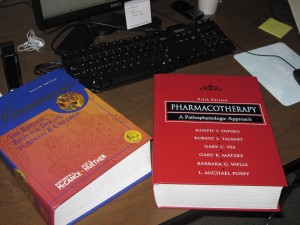When I stop and think about it, I guess there are a lot of ways this experience at the hospital will connect to my curriculum, the students in my Biology class and even students at my school who are not in that class. Spending half a day shadowing healthcare professionals in almost ever clinical area and eating lunch in the hospital cafeteria has given me an opportunity to talk with many different people. So many of my students want to go into healthcare professions and now I will be better able to advise them about different careers, training, volunteer opportunities, internships, and graduation project advisors. I hope to have my mentor and the Nutritionist speak to my class and I will pass on information to my guidance counselor about people who may be potential community partners. The Latino Access Coordinator volunteered to check community education displays my students prepare in Spanish.
I hope that the Project Based Learning (PBL) lesson I am working on will make a big difference in my Biology students’ learning next semester and that they will make a big difference in the community as a result of the community education component of the project. I asked my mentor what were the biggest health problems in Duplin County and one of them was diabetes. I learned that so many problems are linked to diabetes: obesity, kidney damage, eye damage and blindness, nerve damage and amputations, heart disease and strokes, peripheral artery disease, and more. So we will do a PBL unit the extends over the course of the whole semester and connect what we are learning in Biology to diabetes whenever possible. (I’ve never created such a big PBL before, so I’m a little nervous about this.) There will be a number of major projects including presentations at an elementary school and displays that could be put in the hospital lobby, doctor’s offices, an optometrist’s office, the library, or other community education venues. Hopefully my students will be engaged and empowered by these projects.
I realized another connection between my externship and my classroom while I was trying to learn background information about diabetes. My mentor lent me a couple very thick textbooks on pathophysiology and pharmacotherapy that were way over my head. I spent a day and a half struggling through pafter page of fine print with each sentence containing 3 or 4 vocabulary words like diabetic ketoacidosis. It was so frustrating, overwhelming and tiring. I wondered if this is what it’s like for ESL students in my science classes where the academic vocabulary has so many words you don’t come across in everyday life. I have been thinking about what I need to do differently for those students and if any of you have suggestions, please let me know!!

I don’t know if this is of any value to you, Anne, but I have some personal insight about obesity and diabetes. In 2007, I was diagnosed by my doctor as being morbidly obese. It wasn’t news to me. I knew I was not healthy, I just haven’t a name for the various incapacities. I learned that my weight was the reason why I would wake up gagging in the middle of the night and felt like I was drowning. I was. It’s a symptom of sleep apnea — caused by obesity. I learned that my frequent migraines were caused by my high blood pressure which was in turn caused by my weight. I knew that I had trouble walking or climbing stairs because of my weight, but I didn’t know I was also now at risk for diabetes.
I began to work through a systematic process of clinical weight loss assistance that didn’t help to relieve the weight, and, in fact, didn’t keep me from continually gaining. A very long process (and many stories) later, I was recommended for surgical weight loss because no other medical intervention was helping. That led to a journey of education for me and my support person, my husband, as we discovered surgical weight loss: options, expectations, life style, and needs. We finally decided that it was my best option AND that I was a suitable candidate. I underwent the gastric bypass procedural option four years ago tomorrow. It has been a life altering process and event and I am grateful that medical advances have given me a second chance at health.
Here’s where it might be interesting to your studies. All those medical conditions I mentioned earlier absolutely evaporated within the first two weeks post-op! I worked with Hickory’s Frye Surgical Weight Loss program and they work with me even today. I can’t say enough about their PROCESS and their support program! Furthermore, they are still doing research today. Every year when I return to visit, I fill out a questionnaire that they use to inform their practice! I have been told that this surgery CONSISTENTLY resolves diabetes and hypertension in patients. It has also been consistent with the sleep apnea, but that wasn’t a health concern you listed.
I have always been open and frank about this aspect of my life, but I have never written about it. It’s a little weird. I hope, though, that it’s helpful information, or at least interesting!
Thanks for sharing Kimberly T! You taught me a LOT!! I sooo love my cohort partner 🙂
Your project sounds sooo exciting! Planning to have the nutritionist and mentor come speak to your will be invaluable to your learners. I actually started a monthly Career Seminar for our 8th graders. About 2 or 3 sessions in, we realized that the seminars were the highlight of many of our learners’ month. Great way to bring their futures inches closer….
I sounds like you’re off to a great start. Your externship sounds really interesting.